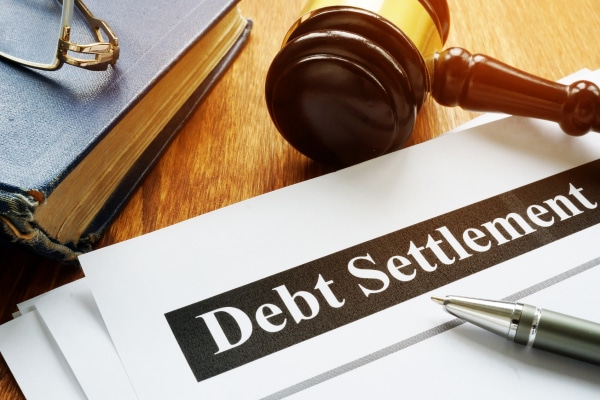
Debt settlement programs in Florida to manage overwhelming debt by negotiating with creditors to reduce the total amount owed. These programs can be an alternative to filing for bankruptcy, providing a structured path to becoming debt-free without the long-term effects that bankruptcy can have on your credit score.
Many Florida residents find debt settlement a viable option when they cannot meet their monthly payments on credit card debt, medical bills, or other unsecured debts. At Fleysher Law, we help our clients know the benefits and risks of these programs.
These programs allow you to set aside a fixed amount of money each month in a separate account, which is then used to negotiate settlements with creditors. The goal is to lower the total debt amount, sometimes considerably, making it easier to pay off in a shorter period of time.
However, you must choose a reputable debt settlement company and comprehend the terms and conditions of the program you enter. Being well-informed can help you avoid pitfalls and maximize the debt relief options available.
Debt settlement programs are designed to help individuals negotiate with creditors to reduce the amount of debt they owe. These programs typically involve hiring a debt settlement company that negotiates with credit card companies and other creditors on your behalf. The process aims to lower your overall debt load through lump-sum settlements paid from an account you fund over time.
The effectiveness of debt settlement programs can vary based on your debt amount, the creditors involved, and your financial stability. Enrolling in these programs can provide great relief by reducing the amount you owe, but it also requires discipline and consistency in saving the agreed-upon amount for settlements.
Choosing a trusted and experienced debt relief company is critical to ensure your interests are well-represented.

The first step when enrolling in a debt settlement program is to stop paying creditors directly. Instead, you start contributing to a dedicated savings account through the debt settlement company. This pool of funds will be used to make settlement offers to creditors.
Once enough money has accumulated, the debt settlement company contacts your creditors to negotiate a reduced payment amount that counts as payment in full. These negotiations can take several months, and success is not guaranteed.
The process requires patience and a steady commitment to saving, as it can extend over several years depending on the total debt and the monthly savings you can afford.
Debt settlement and bankruptcy both affect credit scores but in different ways. Debt settlement can negatively affect your credit score when you cease making payments, though it is generally less severe than the repercussions of a bankruptcy filing. A bankruptcy can remain on your credit report for up to ten years.
In contrast, settled debts are typically removed sooner, providing a quicker path to credit recovery for those who successfully negotiate settlements.
Legal protections also vary greatly between these two options. Bankruptcy offers robust legal safeguards against creditors, including halting most debt collection efforts and lawsuits.
Debt settlement does not provide this protection, and creditors may continue to pursue collection actions during negotiations. This difference can be vital for individuals who face aggressive creditor tactics and require immediate relief.
However, you must remember that certain types of debt, such as mortgage debt, may be dischargeable in bankruptcy but not in a debt settlement agreement.
Financial control and the time required to achieve debt freedom differ between these two approaches. Debt settlement allows you to maintain more control over the process, including the amounts you agree to pay.
In contrast, bankruptcy, particularly Chapter 13, involves court supervision over which assets are liquidated and how creditors are paid, often through a 3-5-year repayment plan.
Debt settlement can sometimes resolve debts faster than a bankruptcy process, but its success heavily depends on your ability to save sufficient funds for settlements.

Enrolling in a debt settlement program typically leads to a temporary decline in your credit score. This happens because you stop making regular payments as negotiations proceed.
However, once debts are settled and you begin rebuilding your financial practices, your credit score can gradually improve. Considering this consequence as part of your overall debt relief strategy is paramount.

Understanding the legal aspects of debt settlement is crucial to ensuring your protection throughout the process. You need to know the terms and conditions of your debt settlement agreement and the legal rights of creditors and debt collectors.
Working with a knowledgeable lawyer can help you navigate these legal waters efficiently.
Debt settlement companies act as intermediaries between you and your creditors. They negotiate to lower your total debt. Choosing a company that operates legally and ethically is important, as this favorably affects the success of your debt settlement efforts.
Be vigilant against companies that promise unrealistic outcomes or charge fees before settling your debts. Research thoroughly and select a company that is transparent about its fees and success rates. Recognizing and avoiding scams is vital to protecting your financial interests.

Debt consolidation involves taking out a new loan to pay off multiple debts, simplifying your payments into one monthly installment. This can often result in lower interest rates and quicker debt repayment. Multiple debt consolidation loans are available. We can help you see if a debt consolidation loan is right for you.
Credit counseling offers a structured way to manage your debts through a debt management plan. This involves negotiating lower interest rates and monthly payments with creditors. Nonprofit credit counseling agencies are available. Let us help you find the right one.
For some, bankruptcy might be a more suitable option, especially if debts are overwhelmingly high or there's little hope of improving financial situations through other means. We can compare this to debt relief programs and help you select the right one to meet your needs. You may need to meet with a certified credit counselor to help you establish a plan to rebuild your finances.
At Fleysher Law, our dedicated team recognizes the complexities of debt relief, including debt settlement and bankruptcy. We advocate fiercely for our clients, ensuring they receive the best advice and representation tailored to their unique financial situations. Our approach involves thoroughly assessing your debts, assets, and overall financial goals.
We provide clear, actionable strategies to protect your assets and improve your financial outlook. Our legal expertise ensures you navigate the debt settlement or bankruptcy process confidently. We fight to secure the most favorable outcomes, emphasizing your rights and best interests. We can help you find the right debt settlement services to meet your needs.

If you're overwhelmed by debt and considering debt settlement, Fleysher Law is here to help. Our Florida bankruptcy lawyers will review your financial situation, discuss your options, and guide you through the best steps forward.
Florida debt relief is available, and we can help you review your debt relief options and choose the right debt settlement programs for Florida management. to meet your needs.
Contact us today to schedule a free case consultation.

"*" indicates required fields